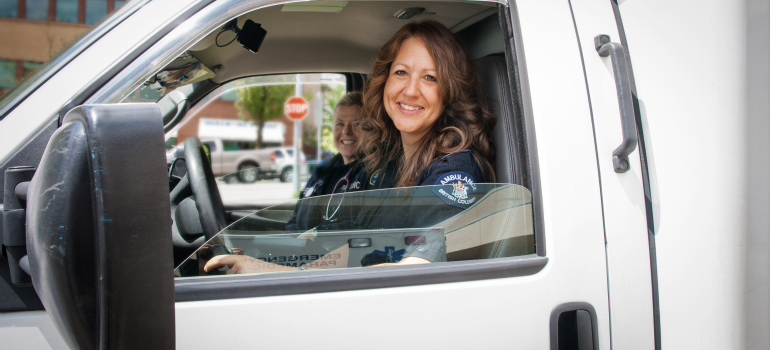Study looks to improve sleep for shiftworkers and reduce the risk of cancer
Renee MacCarron, a paramedic with BC Ambulance Service in South Surrey, finishes a night shift at 7 a.m., heads home to get her three children off to school, and crawls into bed. She falls asleep immediately.
Three or four hours later, however, her brain – and her body – are going again. For a person on a normal schedule, it would be like waking up at midnight to go grocery shopping and then helping the kids with homework before leaving for work, again.
“I find shift work really takes its toll,” says MacCarron, 47, whose schedule consists of two 12-hour day shifts, two 12-hour night shifts and four days off. “My short-term memory is particularly bad after night shifts. My children will ask me for permission to go to a friend’s house and then a couple of days later, they’re getting ready to leave and I won’t remember the conversation. It happens all the time.”
“I love my job, but knowing it can potentially have a risk like that is disconcerting.”
Women are concerned about increased risk
Working night shifts for the past 25 years has not only left MacCarron exhausted, it also has increased her risk of breast cancer. The International Agency for Research on Cancer has identified shift work that disrupts sleeping patterns as a probable cause of cancer, and research has linked it with increased breast cancer incidence.
“I love my job, but knowing it can potentially have a risk like that is disconcerting,” MacCarron says. “I was gung-ho to participate in a study that I hope can help future shift workers.”
With the support of the Canadian Cancer Society, UBC researchers are examining whether improved sleep habits can reduce the risk of breast cancer in women who work night shifts, such as nurses, emergency dispatchers and casino workers.
Led by Carolyn Gotay, a professor in the School of Population and Public Health, the study is exploring the impact of a sleep program on risk factors for breast cancer – not only diet and exercise, but the condition of their breast tissue (density and changes to density over time), production of the hormones cortisol and melatonin, and levels of insulin, vitamin D, glucose and certain proteins.
A new resource for workplaces
“We know women are very concerned about their increased risk, but there are very few programs currently available to help them,” says Dr. Gotay, who is the Canadian Cancer Society Chair in Primary Cancer Prevention. “If our sleep intervention is beneficial, we’re hoping workplaces and unions may make this support available to their workers.”
During the study, participants including MacCarron complete a sleep program (in which a ‘coach’ provides regular advice for sleeping better), keep a diary to chronicle the quality of their sleep, and wear a wristwatch-like device that monitors their sleep efficiency and physical activity by measuring movement and sensing light.
“Sleep is a skill that takes practice,” MacCarron says. “I can’t believe how much my sleep has improved just by using the techniques I’ve learned. I’m more refreshed.”
This is one of two studies funded by the Canadian Cancer Society currently underway at the Cancer Prevention Centre, a partnership between the Canadian Cancer Society and UBC. The other study is evaluating the effectiveness of three workplace wellness strategies to decrease employees’ cancer risk.
“We’re hoping the study of shift workers will give us further insight into the cancer risk, as well as how to help workplaces put preventative measures in place to reduce that risk and save lives,” says Barbara Kaminsky, CEO, Canadian Cancer Society, BC & Yukon. “If we can do this, it would be another significant step forward in cancer prevention.”
Anyone interested in participating in the study should contact project manager Carola Muñoz at 604-822-1315, or email shiftworkers.cancerprevent@ubc.ca. More information on the study can be found here.


